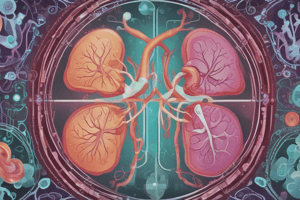Podcast
Questions and Answers
What is the primary function of the kidneys that is impaired in acute kidney injury?
What is the primary function of the kidneys that is impaired in acute kidney injury?
- Removing waste products and excess fluids (correct)
- Storing nutrients for energy production
- Regulating blood pressure
- Producing hormones to regulate blood sugar
Which of the following is a cause of prerenal acute kidney injury?
Which of the following is a cause of prerenal acute kidney injury?
- Urinary tract obstruction
- Prostate cancer
- Kidney stone
- Low blood pressure (correct)
What is the term for the pressure at which blood flows through the kidneys?
What is the term for the pressure at which blood flows through the kidneys?
- BP
- Renal pressure
- Perfusion pressure
- MAP (correct)
Which of the following is a laboratory indicator of acute kidney injury?
Which of the following is a laboratory indicator of acute kidney injury?
What is the term for the type of acute kidney injury that occurs when there is a mechanical obstruction in the urinary tract?
What is the term for the type of acute kidney injury that occurs when there is a mechanical obstruction in the urinary tract?
Which of the following is a characteristic of iron deficiency anemia?
Which of the following is a characteristic of iron deficiency anemia?
What is the primary cause of vitamin deficiency anemia?
What is the primary cause of vitamin deficiency anemia?
Which of the following is a symptom of sickle cell anemia?
Which of the following is a symptom of sickle cell anemia?
What is the primary treatment for anemia of chronic disease?
What is the primary treatment for anemia of chronic disease?
Which of the following is a characteristic of iron deficiency anemia?
Which of the following is a characteristic of iron deficiency anemia?
What is the genetic cause of sickle cell anemia?
What is the genetic cause of sickle cell anemia?
Which of the following is a characteristic of vitamin deficiency anemia?
Which of the following is a characteristic of vitamin deficiency anemia?
What is the primary treatment for iron deficiency anemia?
What is the primary treatment for iron deficiency anemia?
Which of the following is a symptom of anemia of chronic disease?
Which of the following is a symptom of anemia of chronic disease?
What is the characteristic of red blood cells in sickle cell anemia?
What is the characteristic of red blood cells in sickle cell anemia?
Flashcards are hidden until you start studying
Study Notes
Acute Kidney Injury (AKI)
- AKI is a sudden renal damage that occurs when the kidneys are unable to perform their functions, including filtering the blood, removing waste products and excess fluids, and regulating electrolyte levels.
Types of AKI
Prerenal AKI
- Occurs before the kidneys, due to decreased perfusion
- Causes:
- Low blood pressure (BP) leading to low perfusion, resulting from shock, hypovolemia, or dehydration due to blood or volume loss
- Obstruction blocking blood flow and oxygen, resulting from emboli, clots, or tumors
- Low mean arterial pressure (MAP) ≤ 1.3, indicating poor kidney function
Postrenal AKI
- Occurs after the kidneys, due to mechanical obstruction in the urinary tract
- Causes:
- Benign prostatic hyperplasia (BPH), prostate cancer, or stones
- Elevated creatinine levels (> 1.3), indicating poor kidney function
- Elevated blood urea nitrogen (BUN) levels (> 20), indicating poor kidney function
- Decreased urine output
Anemias
Iron Deficiency Anemia
- Most common type of anemia worldwide
- Caused by inadequate iron intake, poor absorption, or chronic blood loss
- Characterized by microcytic and hypochromic red blood cells
- Low serum iron levels and increased total iron-binding capacity
- Symptoms include fatigue, weakness, shortness of breath, and pale skin
- Treatment involves iron supplements and dietary changes to increase iron intake
Vitamin Deficiency Anemia
- Caused by deficiencies in vitamin B12 and folate
- Characterized by macrocytic red blood cells and hypersegmented neutrophils
- Elevated homocysteine levels
- Symptoms include fatigue, weakness, shortness of breath, pale skin, and neurological symptoms in B12 deficiency
- Treatment involves vitamin supplements and dietary changes to increase vitamin intake
Sickle Cell Anemia
- Genetic disorder affecting hemoglobin production
- Caused by mutation in HBB gene
- Characterized by abnormal hemoglobin production and sickling of red blood cells
- Chronic hemolysis and recurring episodes of pain
- Symptoms include fatigue, jaundice, and increased risk of infections
- Treatment involves pain management, blood transfusions, hydroxyurea therapy, and bone marrow transplantation in severe cases
Anemia of Chronic Disease
- Caused by chronic inflammation or infection
- Characterized by normocytic or microcytic red blood cells and low serum iron levels
- Elevated hepcidin levels
- Symptoms include fatigue, weakness, shortness of breath, and pale skin
- Treatment involves underlying disease management, iron supplements if necessary, and erythropoiesis-stimulating agents (ESAs)
Studying That Suits You
Use AI to generate personalized quizzes and flashcards to suit your learning preferences.



